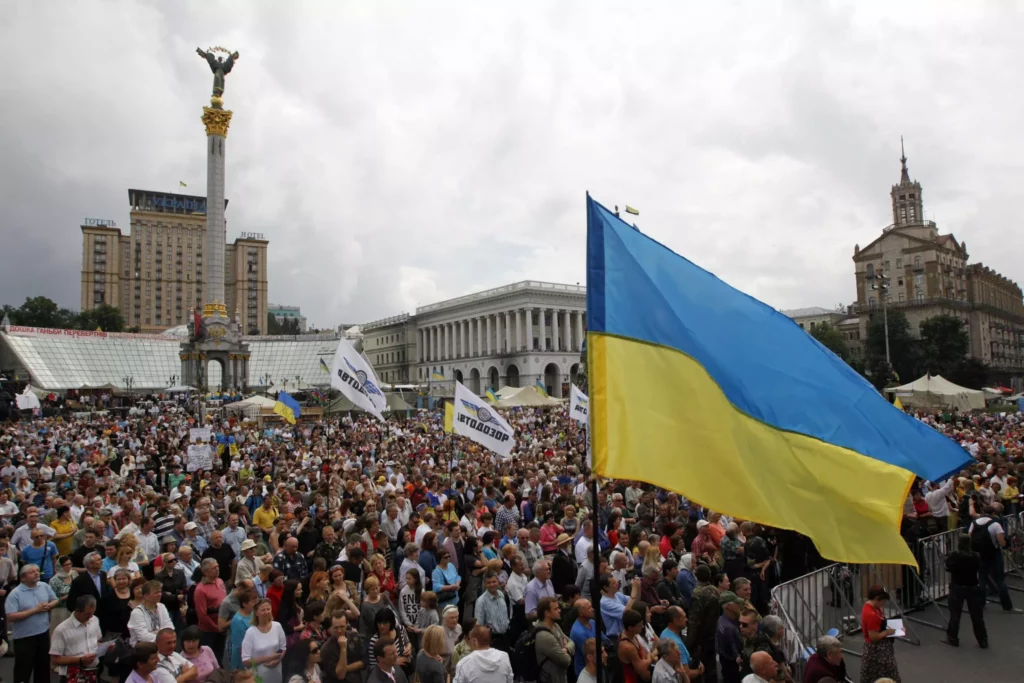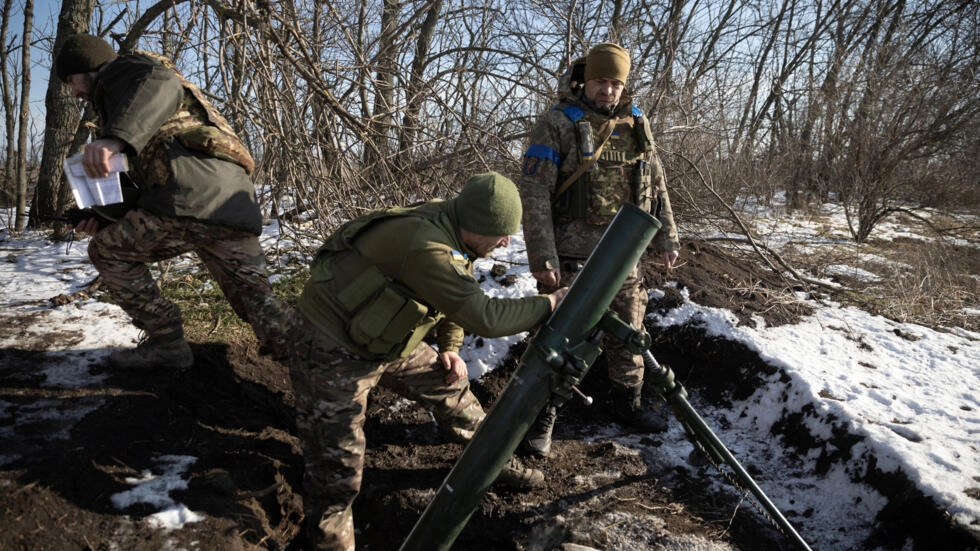February 24 will go down in history as the day of the invasion of Ukraine by Russian forces. Far from being a surprise, the conflict was slowly taking shape behind the scenes of the geopolitical chessboard and has roots much deeper in time, as Gunther Rudzit, professor of Foreign Relations at ESPM, in São Paulo, tells us.
(RFI) “The transformation of Ukraine into an independent nation in 1991 was a hard blow for Russia – together they were part of the Soviet Union and before that, of the Russian empire itself. They are two very culturally intertwined poles,” he explains.
“Russia fought for many years with Ukraine, both for possession of the Black Sea fleet, which was stationed there in Sebastopol, and for nuclear weapons. And overnight, literally, on December 26, 1991, Ukraine emerged as the third largest nuclear power on the planet,” Rudzit adds.
“And then there was a negotiation for a number of years so that finally, in 1995, the Budapest memorandum was signed between Ukraine, Russia, Britain, the United States, in which Russia pledged to respect Ukraine’s security once Kiev returned the nuclear warheads to Russia and signed the Nuclear Non-Proliferation Treaty (NPT). So ever since then, Ukraine has been saying that its integrity is assured by this memorandum,” the analyst continues.
Rudzit points to other events that may have provoked resentment on Vladimir Putin’s part, such as the Orange Revolution in 2004-2005, “when two Viktors – Yushenko on the more Ukrainian west side and Yanukovich on the Ukrainian east side of Russia contested an election. The pro-Russian candidate won, sparking a series of protests whose symbol was the orange flag, representing the Ukrainian side. A new election was called and the Ukrainian representative was elected.
In 2014, now with the pro-Russia Yanukovich in the presidency, Ukraine begins negotiations for a free trade agreement with the European Union. Putin intervenes and proposes a free trade area between Russia and Ukraine to block discussions with Europe.
“In addition, Moscow would pay off the entire Ukrainian foreign debt for that year,” adds the political scientist. Ukraine’s withdrawal from the European Union sparked a popular uprising, the Maidan revolution. “Putin claims it was Western interference – weeks later there was the invasion of Crimea and only later did Putin admit the participation of Russian troops and Ukrainians from Lugansk and Donetsk. That is, for Ukrainians, this war started in 2014,” he explains.
Rudzit also recalls the proposal, as far back as 2008, for Ukraine to join NATO, made by former President George W. Bush. This set off alarm bells among the Russians, as it would mean that American tanks could post up about 600km from the border of the two countries. “That, in the Russian mentality, is inadmissible, because for the Russian, the biggest threat has always come from the West. We cannot forget that the two great invasions of Russia – through Napoleon and Hitler – came from the West, and passed through there. So the security of that western frontier has always been something very, very dear to the Russians. And I’ll be very honest, I suspect that Washington wanted this war,” he opined.
Energy as a Weapon of Dependence
Gunther Rudzit recalls that the United States has always tried to prevent Europe from buying oil from Russia – or the Soviet Union – since the early 19th century, so that Europeans would remain dependent on Americans.
“One must not forget that from the late 18th century to the early 19th century, until more or less the 1950s, the largest producers and exporters of oil in the world were the United States. This dependence grew after World War I and skyrocketed after World War II. But with the Second World War, the Americans realized that they should save, save their oil in case a conflict occurred, a new war. And that is why Europeans became dependent on oil and then gas from the Middle East.
The Americans “managed for many years to prevent Europe from buying gas from the Soviet Union,” he continues. The economic crisis of the 1980s changed this trend. Germany was the first customer for Soviet gas, followed by other countries. “That for Europe, especially for Germany, was very important, because Russian gas is much cheaper than imported gas. That allowed the German economy to grow as it did after reunification. Because of this, this cheap energy was able to compete for many years and still competes with Chinese products. Germany is no longer the largest exporter in the world to China, but it is still competitive. With the war, you definitely broke this ballast. The Europeans became dependent again on gas imports, mainly from the Middle East and also from the United States, which has shale gas. Rudzit recalls that Europe’s dependence on the Americans became not only energy dependence, but military dependence as well.
“The project of a European security of our own is an old project of France, then Germany. This is buried because now they are fundamentally dependent on the United States,” he analyzes.
Putin with no alternatives
“But there have been a series of facts that show that the Biden administration has practically left Putin with no alternatives but to invade. That starts as early as February 7 [of 2022], with Macron’s meeting with Putin, when the French president asks for security guarantees from Russia for Ukraine. On the 12th, Putin talks with Macron and Biden by phone, reaffirming this. On February 14, [Russian Foreign] Minister Lavrov tells Putin that the deal is possible. On the 15th, Olaf Scholz [German Chancellor] meets with Putin and tells the Russian president that Ukraine’s entry into NATO was not on the agenda. The same day, Putin says he will withdraw some troops from the border,” says the expert.
“On the same day, in the evening, Scholz talks to Biden by phone and the American says that concrete evidence of this withdrawal is needed. Hours later, Biden says he has had no sign of it. On the 18th, US Secretary of State Antony Blinken agrees to a meeting with Lavrov in Switzerland. Day 21, Macron says Biden and Putin agree in principle to meet. Day 22, Russia says it is ready to negotiate and that Lavrov will go to Geneva to discuss the crisis with Blinken. By the end of the day, Blinken says the meeting is impossible in the face of Russian troop progression toward Ukraine. On the 23rd, Russia accuses the United States of hindering the negotiations with Ukraine. And then, on the 24th, the invasion,” Rudzit summarizes.
The expert believes that there were a few more moments when a direct negotiation between Russia and the United States would be possible, and that, by the decision of the United States, these meetings did not take place. “On the 26th, two days after the invasion, the famous call occurs from President Biden offering Zelensky a plane to get out of Ukraine. He responded with the famous line ‘I don’t need a plane, I need weapons.’ The West was certain that Ukraine would fall in a matter of days. Today it is said that a maximum of 72 hours was expected.
Rudzit points to other important moments in the conflict, such as Moscow’s show of force when it sent a 60km column of tanks toward Kiev in late February. “On March 12, Biden announces more aid to Ukraine, mainly in armaments. And then, finally, on April 1, Russian troops pull back from the direction of Kiev. This to me is the end of the first phase. It shows that the Russian plans had gone completely wrong. “
In the following months, the Russian offensive advances, but not without resistance. The Azovstal plant, for example, became a symbol of Ukrainian resistance. In August and September, strengthened by Western weapons, Ukraine launches a counter-offensive in the Kherson region.

Millions of Ukrainians have left their homes and the country since the conflict began.
In October, Ukrainian forces blow up the bridge connecting Crimea to Russia. Moscow announces the annexation of four Ukrainian regions – Lugansk, Donetsk, Kherson and Zaporijia, despite international condemnation. In November and December, Ukraine continues to regain territory and weaken Russian forces.
From a war foretold, which turned out to be surprising in duration, the world is faced with an unpredictable denouement. “Putin may feel cornered and react by escalating,” fears Gunther Rudzit. “The world will no longer be the same after this war.”
*** Translated by the DEFCONPress FYI team ***
